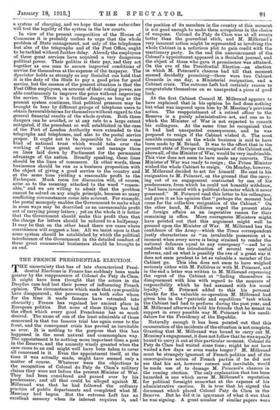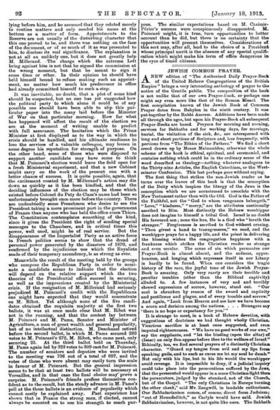THE FRENCH PRESIDENTIAL ELECTION.
THE uncertainty that has of late characterized. Presidential Elections in France has suddenly been made greater by the reappearance of Colonel du Paty de Clam. It might have been thought that the actors in the Dreyfus case had lost their power of influencing French opinion. The circumstances which made that case possible have disappeared ; the personages on both sides whom for the time it made famous have retreated into obscurity ; France has regained her ancient place in European politics. But none of these things has had the effect which every good Frenchman has so much desired. The name of one of the least admirable of those concerned in that too famous trial has again come to the front, and the consequent crisis has proved as inevitable as ever. It is nothing to the purpose that this has happened in the most natural and commonplace way. Tho appointment is to nothing more important than a post in the Reserve, and the amnesty wisely granted when the case came to an end might well have been taken to cover all concerned in it. Even the appointment itself, at the time it was actually made, might have seemed only a matter of course. Whatever were the objections to the recognition of Colonel du Paty de Clam's military claims they were not before the present Minister of War. They had been considered and passed over by his predecessor, and all that could be alleged against M. Millerand was that he had followed the ordinary practice of public departments and completed what M. Messimy had begun. But the extreme Left has an excellent memory when its interest requires it, and the position of its members in the country at this moment is not good enough to make them scrupulous in the choice of weapons. Colonel du Paty de Clam was at all events better than the proverbial stick, and M. Millerand's very innocent action might be represented as involving the whole Cabinet in a nefarious plot to gain credit with the reactionary party. In the end the announcement of the Colonel's appointment appeared in a Socialist journal, and the object of those who gave it prominence was attained. On the eve of the Presidential Election—an election in which M. Poincare's chances had till that moment seemed decidedly promising—there were two Cabinet Councils in one day, a Ministerial resignation, and a Cabinet crisis. The extreme Left had certainly reason to congratulate themselves on so unexpected a piece of good luck.
At the first Cabinet Council M. Millerand appears to have explained that in his opinion he had done nothing but what was imposed upon him by M. Messimy's previous action. The reappointment of a retired officer to the Reserve is a purely administrative act, and one as to which the Minister of War is not expected to consult his colleagues. At the same time he recognized that it had had unexpected consequences, and he was prepared to resign if the Cabinet wished it. The most sensible comment on the whole business is said to have been made by M. Briand. It was to the effect that in the present state of Europe the resignation of the Cabinet and, above all, of the Minister of War, would be very inadvisable. This view does not seem to have made any converts. The Minister of War was ready to resign; the Prime Minister wished the whole Cabinet to resign. On Monday, however, M. Millerand decided to act for himself. He sent in his resignation to M. Poincare, on the ground that the carrying out of an engagement contracted by one of his predecessors, from which be could not honestly withdraw, "had been invested with a political character which it never possessed." M. Poincare read this letter to his colleagues, and gave it as his opinion that "perhaps the moment had come for the collective resignation of the Cabinet." On the other hand, M. Fallieres urged the present state of foreign affairs as an imperative reason for their remaining in office. More courageous Ministers might have pointed out that this argument might well be pressed upon the Minister of War. M. Millerand has the confidence of the Army—which the Times correspondent justly characterizes as "an invaluable possession at a moment when every nerve is being strained to render the national defences equal to any emergency "—and he is credited with the introduction of several very useful reforms, and on what is possibly the eve of a great war it does not seem prudent to let so valuable a member of the Cabinet go. This idea does not seem to have weighed seriously either with M. Fallieres or with M. Poincare, and in the end a letter was written to M. Millerand expressing the regret of the Cabinet at "finding themselves in disagreement with him with regard to the measure of responsibility which he had assumed with his usual loyalty." M. Poincare added to this his personal thanks for the valuable co-operation M. Millerand had given him in the "patriotic and republican" task which the Cabinet had had to perform during the past year, and M. Millerand afterwards told his friends that he meant to support in every possible way M. Poincare in his candidature for the Presidency of the Republic.
Naturally enough it has been pointed out that this enumeration of the incidents of the situation is not complete. Granting that M. Millerand was bound to carry out M.
Messimy's engagement, it does not follow that he was equally bound to carry it out at this particular moment. Colonel du Paty de Clam had waited some time ; might he not have waited a few days or even weeks longer ? Millerand must be strangely ignorant of French politics and of the unscrupulous action of French parties if he did not see that his act, however correct and inevitable, would be made use of to damage M. Poincare's chances in the coming election. The only explanation that has been hazarded is one which saves M. Afillerand's reputation for political foresight somewhat at the expense of his administrative caution. It is true that he signed the document which placed Colonel Poly de Clam in the Reserve. But he did it in ignorance of what it was that he was signing. A. great number of similar papers wera lying before him, and he assumed that they related merely to routine matters and only needed his name at the bottom as a matter of form. Appointments to the Reserve are not usually of the disturbing character that this one proved to be, and there was nothing on the face of the document, or of so much of it as was presented to him, to disclose its real significance. The explanation is not at all an unlikely one, but it does not greatly help M. Millera.nd. • The charge which the extreme Left bring against him is not that he signed the commission at the wrong moment, but that he meant to sign it some time or other. In their opinion he should have held himself bound to refuse making such an appointment, no matter how much his predecessor in office had already committed himself to such a step.
It was inevitable, no doubt, that a plot of some kind should be suspected, but no one has yet suggested how the political party to which alone it could be of any possible use should have been able to slip this particular paper into the many laid before the Minister of War on that particular morning. How far what has happened will affect the result of the election we are at the moment of writing unable to predict with full assurance. The hesitation which the Prime Minister at first displayed as to the way in which the crisis should be handled, and his ultimate readiness to lose the services of a. valuable colleague, may lessen in some degree his reputation for strength of purpose. On the other hand, some of those who were disposed to support another candidate may have come to think that M. Poincare's election would leave the field open for a fresh Ministerial experiment, and that a new Cabinet might carry on the work of the present one with a better chance of success. It is quite possible, again, that the excitement created by M. Millerand's action may die down as quickly as it has been kindled, and that the deciding influences of the election may be those which existed before Colonel du Paty de Clam's name had been so unfortunately brought once more before the country. There are undoubtedly some Frenchmen who desire to see the President taking a more prominent part in the government of France than anyone who has held the office since Thiers. The Constitution contemplates something of the kind, since it gives the President the right of sending special messages to the Chambers, and in critical times this power, well used, might be of real service. But the disappearance of the Imperialist Party as an active force in French politics seems to show that the dread of personal power generated by the disasters of 1870, and confirmed by the injudicious use which the Royalists made of their temporary ascendency, is as strong as ever.
Meanwhile the result of the meeting held by the groups who compose the Republican Party in order to nominate a candidate seems to indicate that the election will depend on the relative support which the two theories of the Presidential office succeed in securing, as well as the impressions created by the Ministerial crisis. If the resignation of M. Millerand had seriously prejudiced M. Poincare's credit with the Republicans one might have expected that they would concentrate on M. Ribot. Yet although none of the five candidates obtained the requisite majority at the first two ballots, it was at once made clear that M. Ribot was not in the running, and that the contest lay between M. Poincare and M. Pams, Senator and Minister of Agriculture, a man of great wealth and general popularity, but of no intellectual distinction. M. Deschanel retired before the second ballot, in which M. Pams secured 283 votes to M. Poincare's 272, M. Ribot, who came next, only securing 25. At the third ballot held on Thursday, M. Pams again led by 323 votes to 309 cast for M. Poincare. The number of senators and deputies who were invited to the meeting was 736 out of a total of 897, and the votes of those who were absent may easily turn the scale in favour of M. Poincare. But the general impression seems to be that at least two ballots will be necessary at Versailles, and in that case the final choice may prove a surprise. M. Poincare's friends profess themselves confident as to the result, but the steady advance in M. Parns's poll at the three ballots is an evidence of popularity which cannot easily be explained away. Past experience has shown that in France the strong man, if elected, cannot always be counted on to use his strength to much pur pose. The similar expectations based on M. Casimir. Perier's success were conspicuously disappointed. M. Poincare might, it is true, turn opportunities to better account than he did, but there is no certainty that the opportunities will present themselves. Considerations of this sort may, after all, lead to the choice of a President whose principal merit is the absence of any special qualification which might make his term of office dangerous in the eyes of timid citizens.







































 Previous page
Previous page